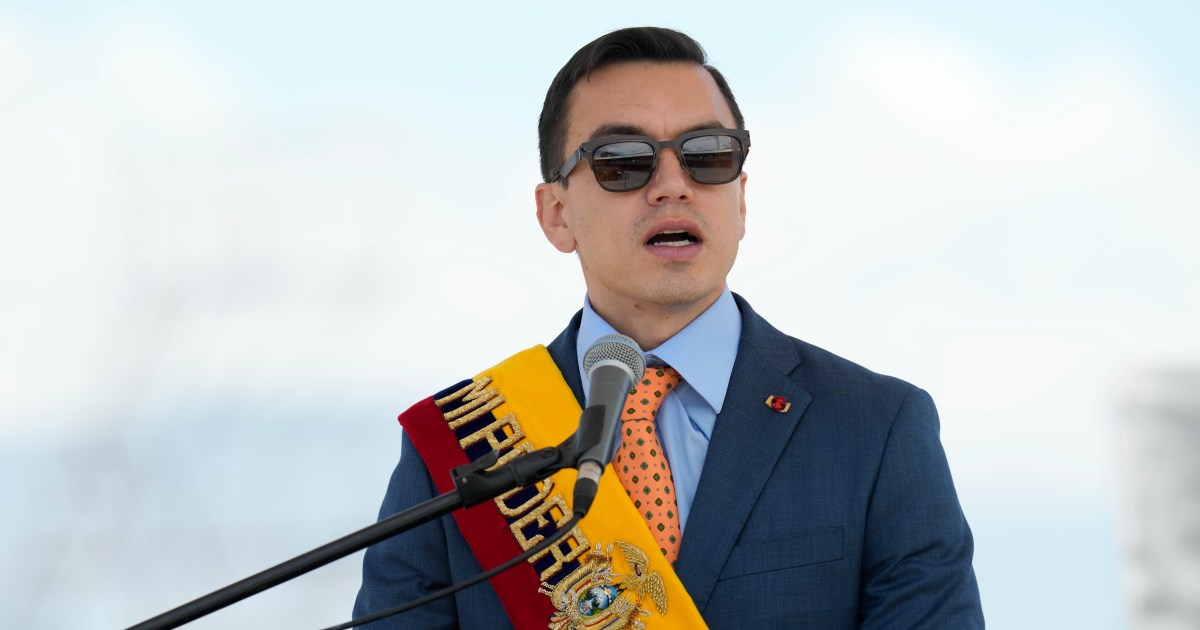South America
A referendum on crime? What to know about Ecuador’s presidential election

A Nation at a Crossroads: Ecuador’s 2024 Presidential Election
Ecuador stands on the brink of a pivotal moment as voters head to the polls on February 9 to determine the country’s next president. Just 18 months ago, Daniel Noboa, now 37, made history by becoming the youngest person ever elected to the presidency. However, his term has been limited to completing the remainder of his predecessor’s term after former President Guillermo Lasso invoked a constitutional mechanism known as the muerte cruzada (crossed death), dissolving the legislature and triggering snap elections. Now, Noboa seeks a full four-year term, facing a competitive field of 15 candidates, including his main rival from the 2023 election, left-wing lawmaker Luisa Gonzalez. The race is poised to be a referendum on Noboa’s leadership, with voters weighing his law-and-order policies against the country’s persisting challenges of violence, economic hardship, and political instability.
The Electoral Process: Understanding the Rules
Ecuador’s electoral system is designed to ensure a clear mandate for the winner. In the first round, a candidate must secure more than 50% of the vote or at least 40% with a 10-point lead over the second-place candidate to win outright. If no candidate meets this threshold, the top two contenders will advance to a runoff on April 13. This system is designed to prevent prolonged uncertainty and ensure legitimacy for the winner.
In addition to the presidency, the election will also determine the composition of Ecuador’s National Assembly, which is expanding from 137 to 151 seats. All seats are up for grabs, and the election will shape the legislative landscape for the next four years. Noboa’s National Democratic Action (ADN) party and Gonzalez’s Citizen Revolution (RC) are currently leading in the polls, but the competition remains fierce.
The Candidates: A Diverse Field with Contrasting Visions
Daniel Noboa, the incumbent, entered office on a platform of law and order, introducing measures to expand police powers and combat rising crime. However, his tenure has been marked by controversy, as critics argue that these measures have come at the expense of civil liberties and oversight. Despite his efforts, Ecuador continues to grapple with high levels of violence and organized crime, casting a shadow over his campaign.
Luisa Gonzalez, Noboa’s main challenger, represents the left-leaning Citizen Revolution party, founded by former President Rafael Correa. Gonzalez has criticized Noboa’s hardline security policies and advocates for a more balanced approach to addressing crime and inequality. She narrowly lost to Noboa in 2023 but remains a formidable opponent, with most polls indicating that the race will likely head to a second round.
Other notable candidates include Jan Topic, a right-wing businessman who advocates for mano dura (iron-fist) policies to combat crime, and Leonidas Iza, president of the Indigenous confederation CONAIE, who campaigns for greater sovereignty and opportunities for Indigenous peoples. Additionally, Andrea Gonzalez, the former running mate of slain anticorruption candidate Fernando Villavicencio, is also running, highlighting Ecuador’s ongoing struggles with violence and political corruption.
Voter Priorities: Crime, Economy, and Insecurity
As Ecuadorians prepare to vote, a range of issues dominates public discourse. The rising cost of living, inadequate economic opportunities, and recent electricity blackouts have all become pressing concerns. However, crime and insecurity stand out as the top priority for most voters. According to a January poll by Comunicaliza, crime outranks the second-highest concern, lack of employment opportunities, by 14 points.
The country’s once-stable reputation as an “island of peace” in South America has been shattered by a surge in violence and organized crime. In 2023, Ecuador recorded 7,000 murders, the highest per capita rate in the region. This spiraling violence has exposed deep failures in governance and raised questions about state complicity in criminal activities. Many voters are placing their faith in tough-on-crime solutions, but experts warn that without addressing root causes such as corruption, inequality, and socioeconomic disparities, security measures alone will not suffice.
The Rise of Violence: A Crisis with Deep Roots
Ecuador’s descent into violence is a relatively recent phenomenon. For decades, the country was seen as a haven of stability compared to its neighbors, Colombia and Peru, the world’s largest producers of cocaine. However, the COVID-19 pandemic marked a turning point. Economic devastation left many young people unemployed and vulnerable to recruitment by criminal networks. Meanwhile, drug-trafficking groups took advantage of Ecuador’s strategic location and porous borders to expand their operations.
The crisis has also revealed systemic weaknesses in Ecuador’s institutions. President Noboa has accused his predecessors of allowing cocaine production to take root in the country, pointing to the discovery of coca crops on approximately 2,000 hectares of land. His government has responded with aggressive measures, including declaring a state of internal armed conflict and expanding the military’s role in public security. While this approach has yielded some short-term reductions in violence, it has also raised concerns about human rights abuses and the erosion of civil liberties.
The Path Forward: Security and Beyond
As voters consider their options, the conversation around security dominates the political landscape. Most candidates have embraced tough-on-crime rhetoric, with little appetite for alternative approaches like negotiating with criminal groups. However, experts warn that without systemic reforms to address corruption, inequality, and weak institutions, the cycle of violence will persist.
Noboa’s campaign has leaned heavily on his law-and-order credentials, but his opponents argue that his policies have failed to deliver meaningful results. Gonzalez, for her part, has called for a more holistic approach, emphasizing the need to tackle the root causes of crime while ensuring that security measures are balanced with respect for human rights.
The outcome of the election will have far-reaching implications for Ecuador’s future. Will voters opt for continuity with Noboa’s hardline policies, or will they choose a different path under Gonzalez’s leadership? Either way, the challenge of building a safer, more prosperous Ecuador will require more than election-day promises—it will demand sustained effort and collective action from the government, civil society, and the people themselves.